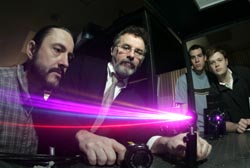Chemistry chair to receive ACS award, present public lecture on strong field chemistry
|
Robert J. Levis, chair of Temple’s Chemistry Department and director of the Center for Advanced Photonics Research, will be presented with the 2007 Philadelphia Section Award by the American Chemical Society during an on-campus ceremony Oct. 18.
|
 Photo by Joseph V. Labolito/Temple University
Chemistry Chair Robert J. Levis (center), a pioneer in laser-based chemistry, will be honored with the 2007 Philadelphia Section Award by the American Chemical Society. Levis and his group began pioneering strong field chemistry more than a decade ago, and have developed applications for this technology in the fields of chemical warfare agent detection, cyclic ozone production, standoff detection and bio-molecule mass spectrometry.
|
|
Since the award’s creation in 1962, Levis becomes only the fourth Temple faculty member to receive the Philadelphia ACS Section Award, and the first since 1980. College of Science and Technology Dean Hai-Lung Dai and Chemistry Professor Franklin Davis also received the award, while at other institutions.
|
|